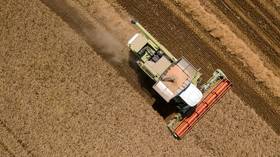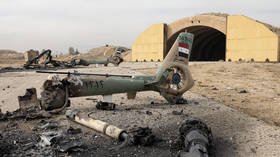Do Russian grain export limits threaten global food security?

With the coronavirus crisis already triggering concerns over food security, some saw the depletion of Russian export quotas for grain as a new and alarming signal.
What happened?
Earlier this month, the Russian government approved seven-million-ton caps on exports of certain crops. The restrictions, intended to secure the domestic food market, apply to such essential crops as wheat and maslin, rye, barley and corn.
The new quotas are effective from April 1 to June 30, and members of the Russia-led Eurasian Economic Union are excluded from the restrictions. These allowances have been used up rapidly and were finally “fully exhausted” on Sunday, according to the Ministry of Agriculture.
What does the quotas’ depletion mean?
Reaching the threshold does not warrant an immediate ban on exports or suspension of grain imports, as traders usually file customs declarations in advance. In fact, shipments are still in progress and are not expected to stop until at least the end of May.
“The quotas were accounted from the [customs] declarations, but actual exports in accordance with those quotas have not happened yet,” President of the Russian Grain Union (RGU) Arkadiy Zlochevskiy told RT.
According to analysts’ estimates, actual April exports will stand at around four million tons of grain, including over three million tons of wheat, and the rest of the shipments go to their buyers next month. Thus exports may not actually be halted before June.
“The world is not going to be left without Russian grain,” Oleg Sukhanov, head of the grain desk at the Institute for Agricultural Market Studies, said in a comment to RT.
Should we start worrying about food supplies & prices?
As Russia is the leading global exporter of wheat, the restrictions imposed by the country amid the coronavirus crisis may cause concerns. Analysts stress that there is no reason to worry until the end of May, when the actual shipments reach the introduced limits, and even after that the market is not expected to face any major shortages.
“The quota volumes are irrelevant for the wheat market, as the exports [under the quota] are the same as they would be without it,” said Andrey Sizov, the head of agriculture consultancy SovEkon.
While Europe is not the main destination for Russian grain shipments, top importers like Iran, Egypt and Turkey could be forced to switch to other sources. As such, the restrictions are not alarming in terms of shortages, but they could damage Russia’s business image, making it look like an unreliable supplier, according to Sizov.
Grain prices rose sharply earlier this month amid expectations of Russia’s restrictions. The depletion of the quota is unlikely to drive prices higher, Sizov says, as weather conditions – on which the new crop depends – are now the main factor impacting the market. Many countries, including Russia, have been suffering from a dry season this year, which can really ramp up grain prices.
On top of the dry season, the coronavirus pandemic has had a significant impact on agriculture, as the subsequent lockdowns have severely disrupted the global supply chain.
According to Ben Aris, editor-in-chief of bne IntelliNews, the disruptions triggered food security concerns, forcing Russia to resort to export restrictions. Despite some nations having already faced shortages of flour, the situation is far from being dire, he noted.
“All countries have their strategic grain reserves, which should be sufficient in order to get through the year and make sure that no-one actually runs out bread,” he said.
For more stories on economy & finance visit RT's business section












